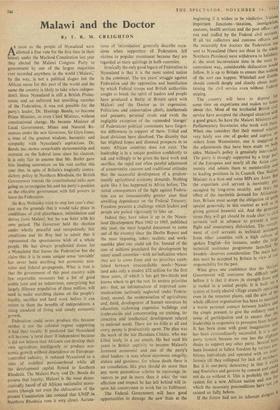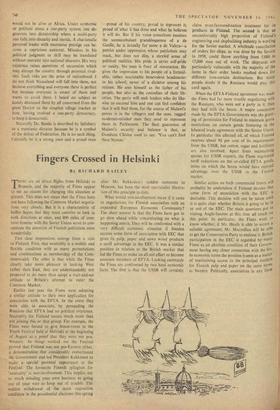Malawi and the Doctor
By T. R. M. CREIGHTON
Asoon as the people of Nyasaland were allowed a free vote for the first time in their history under the Macleod Constitution last year they elected the Malawi Congress Party to government by one of the largest majorities ever recorded anywhere in the world ('Malawi, by the way, is not a political slogan but the African name for this part of the world and the name the country is likely to take when indepen- dent). Since Nyasaland is still a British Protec- torate and an enforced but unwilling member of the Federation, it was not possible for the party's leader, Dr. Hastings Banda, to become Prime Minister, or even Chief Minister, without constitutional change. He became Minister of Local Government, Mines and Natural Re- sources under the new Governor, Sir Glyn Jones, a man of the greatest wisdom, humanity and sympathy v‘ith Nyasaland's aspirations. Dr. Banda has shown remarkable statesmanship and restraint on the federal issue since his election. It is only fair to assume that Mr. Butler gave him binding assurances on his visit earlier this year that, in spite of Britain's tragically contra- dictory policy in Northern Rhodesia, the British Government intends the constitutional talks now going on to recognise his and his party's position as the effective government with full powers to leave the Federation.
Sir Roy Vv'elensky tried to stop last year's elec- tion on the grounds that it would take place in conditions of civil disturbance, intimidation and duress from Malawi, but he was hoist with his own petard. The Governor held the election under wholly peaceful and scrupulously fair conditions and Sir Roy had to admit that it represented the spontaneous wish of a whole people. He has always prophesied .doom for a Nyasaland that leaves the Federation but the claim that it is in some unique sense 'unviable' , has never been anything but economic non- sense and federal propaganda. What is true is that the government of this poor country with few exportable resources but a lot of good arable land and an industrious, enterprising but largely illiterate population of three million, will need to make searching claims on the people's loyalty, sacrifice and hard work before it can return to them the benefits of independence, a rising standard of living and steady economic growth.
Federation could never produce this because neither it nor the colonial regime supporting it had their loyalty. It predicted that Nyasaland will become 'a rural slum' if independent because it did not believe that Africans can develop their own agriculture intelligently or produce eco- nomic grow th without dependence on European- controlled industry. It reduced Nyasaland to a state of stultified pensionerhood while all the development capital flowed to Southern Rhodesia. The Malawi Party and Dr. Banda do possess that loyalty. Malawi is the most demo- cratically based of all African nationalist move- ments (though not even the obfuscation of the present Constitution can conceal that UNIP Northern Rhodesia runs it very .close). Accusa-
tions of Intimidation' generally describe occa- sions when supporters of Federation fell victims to popular resentment because they are regarded as mere quislings in both countries.
Ironically the only good legacy of Federation to Nyasaland is that it is the most united nation in the continent. The ten years' struggle against Federation and the oppression and humiliation by which Federal troops and British authorities sought to break the spirit of leaders and people have produced a Battle of Britain spirit with Malawi and the Doctor as its expression. Politicians and conservative chiefs, intellectuals and peasants, personal rivals and (with the negligible exception of the outmoded `stooges' of Federation) political contestants have forgot- ten differences in support of them. Tribal and local divisions have dissolved. The disunity that has blighted hopes and dimmed prospects in so many African countries does not exist. The leadership is in a unique position confidently to ask and willingly to be given the hard work and sacrifice, the rapid and often painful adjustment of conservative customs and traditional attitudes that the successful development of a predom- inantly agricultural economy demands. Nothing quite like it has happened in Africa before. The moral consequences of the fight against Federa- tion are an immeasurably greater asset than unwilling dependence on the Federal Treasury. Freedom presents a challenge which leaders and people are poised vigorously to take up.
Indeed they have taken it up in the Nyasa- land Development Plan .1962 to 1965, published this year, the most hopeful document to come out of the country since the Devlin Report and the most imposing, sober, realistic and work- manlike plan one could ask for. Instead of the tens of millions postulated for development by many small countries—with no indication where they are to come from and no priorities estab- lished between irreconcilable needs—Nyasa- land asks only a modest i12 million for the first three years, of which it has got two-thirds and knows where to get the rest. Its austere priorities are: first, an infrastructure of improved com- munications (seriously neglected under Federa- tion); second, the modernisation of agriculture; and, third, development of human resources by education, eschewing expensive buildings and irrelevancies and concentrating on training, in- struction and intellectual development related to national needs. There are no frills at all and every penny is productively spent. The plan was the work of the late Dunduzu Chisiza, who was killed lately in a car smash. He had used his years in British captivity to become Malawi's foremost economist and pne of the party's chief leaders—a man whose enormous integrity, stature and goodness, for whose death there is no consolation_ His plan should do more than any more pretentious scheme to encourage in- vestors to put in more than it asks; the vast affection and respect he has left behind will in- spire his countrymen to work for its fulfilment.
The Federal Government will have good opportunities to damage the new State at the
beginning if it wishes to be vindictive. Various important functions—taxation, immigration, customs, health services and the post office—are run and staffed by the Federal civil servants. If all tax collectors and customs officers and the miserably few doctors the Federation has sent to Nyasaland (there are three in the wbolc Northern Province) were withdrawn to SalisburY a; the most inconvenient time in the most in-
convenient way, considerable dislocation wok" follow. It is up to Britain to ensure that nothing
of the sort can happen. Whitehall and Zomba should consult deeply and closely about main: taming the civil service even without Federal sniping. The country will have to some time on expatriates and makdesepneond f honoers, about this. Most of the territorial British Civil service have accepted the changed situation with a good grace. So have the Malawi Ministers and Parliamentary Secretaries who work with thelm When one considers that their mutual relation very lately was one of gaoler and captive, all orders from Westminster, one is staggered at the adjustments that have been made on Mill sides. Malawi's policy is genuinely inter-raciat The party is strongly supported by a large Part of the European and nearly all the Asian conl- munity and admits them to membershin all to leading positions in its Council. One Malawi Minister is a Scot and some MPs are Asian. But the expatriate civil servant is inevitably Pre' occupied by long-term security, and fears the effect of the inevitable demand for Africanisa. tion. Britain must accept the obligation of quite special generosity in this context as well as ja giving general financial aid. And the general terms they will get should be made clear to civl servants well in advance to prevent nlaSS
flight and unnecessary dislocation. The recruit- ment of civil servants as technical assistailt! from other countries with a high culture 01
spoken English—for instance, under the large technical assistance programme launched bY Sweden—deserves consideration. The main bur- den must be accepted by Britain in view of inic responsibility for the past. What gives one confidence that the Nia13,,, Government will overcome the difficult lasi'd before it is that it draws its strength from ala is rooted in a united people. It is built on system of freely elected village councils operatil
o
even in the remotest places, and the aim f 11/.0 whole efficient organisation has been to rnaintal, a warm personal contact between leaders an: the simple peasant, to give the ordinary sense of participation and to ensure that tav: leadership is responsive to pressures front beio‘i, It has been done with great imagination al: has been extraordinarily successful. It is party system, because no one has the slighte desire to support any other party. Several been founded in fullest freedom by various bilious individuals and operated with no inters. ference till they collapsed for lack of meMbe._ts But it is one-party democracy in that it eNI5
old
and flourishes and governs by consent and c° not do so without it. This is probably the ide31 system for a new African nation and one lot which the necessary preconditions have "t
existed so fully before. lt
If the future had not its inherent gctS
would not be alive or Africa. Under economic or political stress a one-party system can de- generate into dictatorship where a multi-party one falls into disunity and inertia. A charismatic personal leader with enormous prestige can be- come a capricious autocrat. Mistakes in his political judgment or skill may be translated without restraint into national disasters. His very existence raises questions of succession which may disrupt the country through personal rival- ries. Such risks are the price of nationhood. I do not think Nyasaland will fall into them, not because everything and everyone there is perfect but because everyone is aware of them and wants to avoid them. I heard no subject so keenly discussed there by all concerned from the great Doctor to the simplest village teacher as how, having evolved a one-party democracy, to keep it democratic.
Naturally Dr. Banda is described by Salisbury as a messianic dictator because he is a symbol of the defeat of Federation. He is no such thing. Certainly he is a strong man and a proud man —proud of his country, proud to represent it, proud of what it has done and what he believes it will do, But if his voice sometimes assumes the somnambulant grandiloquence of a de Gaulle, he is actually far more a de Valera—a patriot under oppression whose patriotism may mask, but does not dim, a shrewd sense of political realities. His pride is never self-pride or vanity. No man is freer of ostentation. He gives the impression to his people of a formid- able. rather inscrutable benevolent headmaster in his school, never of a dictator among his retinue. He sees himself as the father of his people, but also as the custodian of their lib- erties. The party will seek leaders who do like- wise to succeed him and one can feel confident that it will find them, for the source of Malawi's power is in the villagers and the sane, rugged moderate-minded men they send to represent them in Parliament. The final guarantee of Malawi's security and balance is that, as Dunduzu Chisiza used to say, 'You can't fool these Nyasas.'







































 Previous page
Previous page